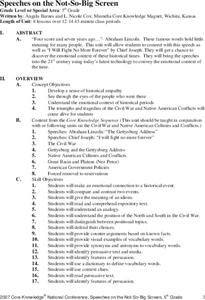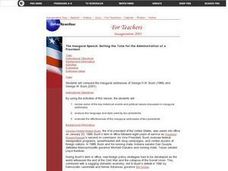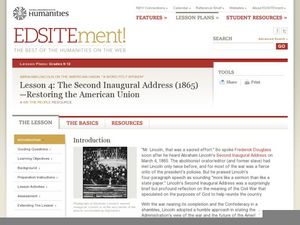Curated OER
Liberty Rhetoric
What is liberty rhetoric? Examine how people have used it in four different time periods and situations. High schoolers investigate original source documents and compare them with the Declaration of Independence to decide how liberty...
PBS
Universal Declaration of Human Rights
What rights are guaranteed to students? Do they align with the Universal Declaration of Human Rights, which was approved by the United Nations in 1948? Middle and high schoolers present persuasive arguments about the rights they believe...
Curated OER
Speeches on the Not-So-Big Screen
Students examine American speeches. In this interdisciplinary lesson, students explore the emotional context of historical periods as they analyze "The Gettysburg Address" and "I Will Fight No More Forever" speeches.
Curated OER
The Armenian Genocide: The American Ambassador in Constantinople
Students analyze America's reaction to the Armenian Genocide. They write a journal response, read and discuss text, compare/contrast reactions around the world to the Armenian Genocide and the genocide in Rwanda, and write an essay.
Federal Reserve Bank
The Free Silver Movement and Inflation
Why are US dollars no longer backed by gold and silver? What is our medium of exchange, and what would it be like to live in a barter economy? Learners consider these questions, as well as learn about the major historical events in the...
National Endowment for the Humanities
Martin Luther King, Jr. and Nonviolent Resistance
Was nonviolent resistance the best means of securing civil rights for black Americans in the 1960s? In this highly engaging and informative lesson, your young historians will closely analyze several key documents from the civil rights...
National Endowment for the Humanities
Chronicling America: Uncovering a World at War
As part of a study of World War I, class members read newspaper articles from the time that urge American involvement, non-involvement, or neutrality. Using the provided worksheet, groups analyze the articles noting the central argument...
Curated OER
Cartoons for the Classroom: Free Speech vs. Respect for Religion
In this historical events worksheet, students analyze political cartoons about the First Amendment. Students respond to 3 talking point questions.
Stanford University
Beyond Vietnam
On April 4, 1967 Martin Luther King, Jr. delivered his speech "Beyond Vietnam." The controversy that followed is the focus of a three-lesson plan unit that asks class members to consider the political and social implications of King's...
Curated OER
Six Day War
Learn about the diverse perspectives involved in the Six Day War by having learners examine and annotate presidential speeches given by the three nations—Egypt, Israel, and the United States—at the heart of the conflict and producing...
John F. Kennedy Presidential Library & Museum
Ask Not What Your Country Can Do for You
Ask not what the lesson here can do for you, but what you can do with the lesson. The answer is quite a lot! Young scholars revisit JFK's famous inaugural address with a focus on his plea for civic engagement. There's a letter to JFK...
West Virginia Department of Education
The Debate - John Brown: Martyr or Madman?
Did he die for a cause, or was he crazy? Although the resource discusses John Brown and West Virginia history, many historical figures have the same reputation. Teach learners about different perspectives and highlight the importance of...
National Endowment for the Humanities
“Read All About It”: Primary Source Reading in “Chronicling America”
Can investigative journalism become too sensationalistic and accusatory, or is it vital for the survival of a democracy? Middle schoolers analyze primary source documents from early 20th-century newspapers as well as Theodore Roosevelt's...
English Worksheets Land
Compare and Contrast
Even though two passages discuss the same topic, they contain different facts and details. Scholars analyze two reading passages about the Gettysburg Address and list the ways they are the same and different.
Curated OER
In The Words of Abraham Lincoln...
High schoolers explore the words of Abraham Lincoln. In this Abraham Lincoln lesson, students analyze segments of "The Gettysburg Address," his annual address to Congress in 1862, and his letter to Mrs. Bixby. High schoolers conduct...
Historical Thinking Matters
Social Security: 3 Day Lesson
What does social security reveal about the political and social culture of the 1930s? After beginning with a brief introductory video on the impact of the Great Depression and how various Americans, such as Huey Long and Francis...
Curated OER
The Gettysburg Address: An American Treasure
Learners apply information found in Lincoln's speeches, especially The Gettysburg Address, to create a persuasive speech on a current topic.
Curated OER
Stand Up and Sing
Students locate historical references in songs. They create music/lyrics to illustrate an historical topic.
Curated OER
Placing the State of the Union in Historical Context
Students review the history of the State of the Union addresses and work in groups to analyze one particular speech as a reflection of its times. They compare modern State of the Union speeches to those given in the past.
Curated OER
The Inaugural Speech: Setting The Tone For The Administration Of A President
High schoolers investigate the Inaugural Speech of the President of The United States while comparing two speeches. They conduct research to find the two speeches on the internet and look at them side by side. The lesson includes...
Facing History and Ourselves
Laws and the National Community
When it comes to the law, is justice always served? Teach scholars about how law sometimes enables prejudice of entire groups of people with a unit on World War II that includes a warm-up activity, analysis of primary sources,...
Curated OER
The Second Inaugural Address (1865)—Restoring the American Union
Students explore the content of Abraham Lincoln's Second Inaugural Address. In this Abraham Lincoln lesson plan, students analyze the text of the speech to determine how Lincoln sought to reconstruct the country as the Civil War drew to...
National Endowment for the Humanities
Courage “In the Time of the Butterflies”: A Common Core Exemplar
The courage of Las Mariposas, the Mirabal sisters, is the focus of a series of activities designed to accompany a reading of In the Time of the Butterflies that ask readers to consider what it means to be courageous. Beautifully crafted...
PBS
Women's History: Parading Through History
Want to teach your pupils about debate, effective speech techniques, propaganda, and the women's movement? The first in a sequential series of three, scholars analyze real propaganda images from the the historic women's movement, view a...

























